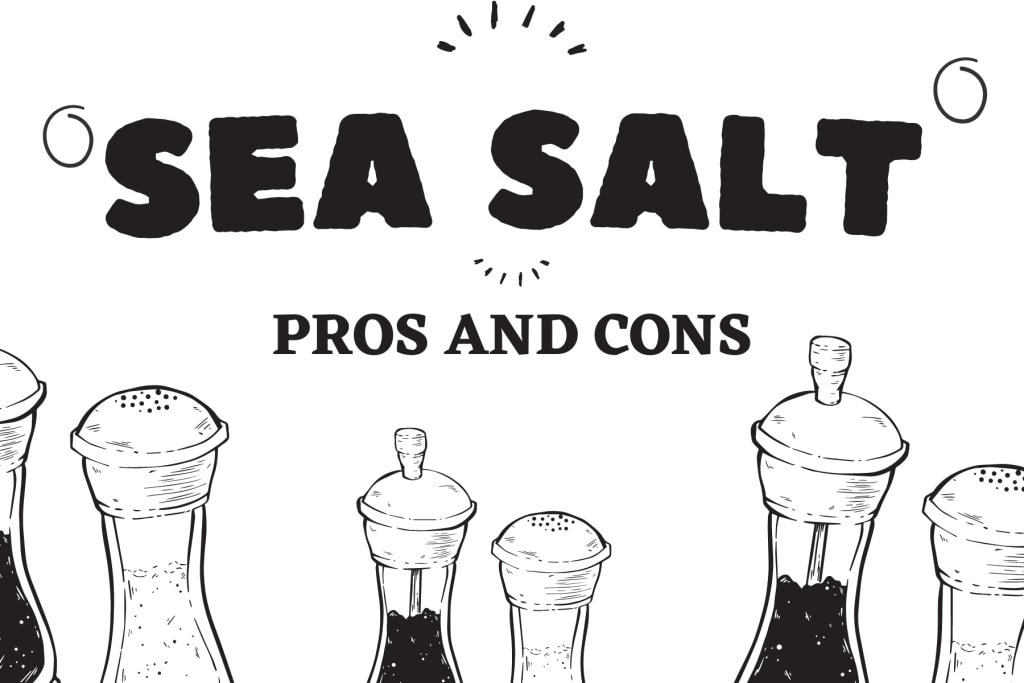Pros and Cons of Salt in your Diet
Salt is a crucial element in our diet. We have been using it for centuries to add flavor to our food, and it is often a staple ingredient in many dishes.

Salt is a crucial element in our diet. We have been using it for centuries to add flavor to our food, and it is often a staple ingredient in many dishes. However, recent studies suggest that consuming too much salt can have adverse effects on our health. In this story, I will explore the pros and cons of salt in our diet.
The Pros of Salt in Our Diet
Salt is essential for our body to function correctly. It helps regulate our body's fluid balance and maintains our blood pressure levels. It also helps our muscles and nerves function correctly. Salt contains sodium, which is essential nutrient that our body needs to function. The World Health Organization recommends that we consume less than 2,000 milligrams of sodium per day.
Furthermore, salt adds flavor to our food. It can make even the blandest of dishes taste good. Salt can enhance the flavor of natural foods and increase their palatability. This can encourage people to eat healthier foods like vegetables, which they might otherwise avoid due to their bland taste.
The Cons of Salt in Our Diet
While salt is essential for our body, consuming too much salt can have adverse effects on our health. Excess salt consumption can lead to high blood pressure, which is leading cause of heart disease and stroke. High blood pressure can damage our blood vessels and cause them to narrow, increasing the risk of heart attacks and strokes.
Moreover, consuming too much salt can lead to other health issues like kidney damage, osteoporosis, and stomach cancer. It can also increase the risk of developing type 2 diabetes.
Furthermore, salt is often found in processed foods, which can be high in calories and low in nutrients. Consuming processed foods can lead to weight gain and obesity, which can increase the risk of heart disease, stroke, and other health issues.
The Middle Ground
It's clear that consuming too much salt can have adverse effects on our health. However, it's equally essential to understand that our body needs some salt to function correctly. The key is to find balance between consuming enough salt to meet our body's needs and not consuming too much salt.
One way to reduce our salt intake is to eat more natural foods like fruits and vegetables. These foods are naturally low in sodium and high in nutrients, making them excellent choices for a healthy diet. Another way is to read food labels and avoid processed foods that are high in sodium.
Additionally, we can replace salt with other seasonings like herbs and spices. These can add flavor to our food without adding sodium. We can also cook our food without salt and add it afterward to control the amount we consume.
Conclusion
Salt is crucial element in our diet, but consuming too much salt can have adverse effects on our health. It's essential to find balance between consuming enough salt to meet our body's needs and not consuming too much salt. We can achieve this by eating more natural foods, avoiding processed foods, and using other seasonings like herbs and spices to add flavor to our food. By doing so, we can maintain a healthy and balanced diet that is beneficial for our overall health and well-being.
Is it good to eat salt every day?
Salt is essential nutrient that our body needs to function correctly, and we do need a certain amount of it every day. However, consuming too much salt can have adverse effects on our health, such as increasing the risk of high blood pressure, heart disease, stroke, kidney damage, osteoporosis, and stomach cancer.
The recommended daily intake of sodium for adults is less than 2,300 milligrams, which is roughly equivalent to one teaspoon of salt. However, many people consume more than this amount due to the high amount of sodium in processed and packaged foods.
It's essential to find balance between consuming enough salt to meet our body's needs and not consuming too much salt. Eating healthy and balanced diet that includes natural foods like fruits and vegetables and avoiding processed foods that are high in sodium can help us achieve this balance.
If you have any concerns about your salt intake or health, it's best to consult with healthcare professional for personalized advice.
About the Creator
MD
I am a poet and writer, entwined in passionate embrace with souls of poets, penning love letters to their words.
If you love my poets give a like, leave comments and share them with love. Don't forget to subscribe to my profile.
Thank you!
Enjoyed the story? Support the Creator.
Subscribe for free to receive all their stories in your feed. You could also pledge your support or give them a one-off tip, letting them know you appreciate their work.






Comments
There are no comments for this story
Be the first to respond and start the conversation.